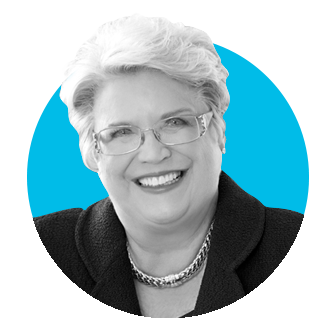THE FINAL WORD / Conversations with Business and Technology Leaders
Linda Hudson, chairman and CEO of The Cardea Group, has come a long way. It wouldn’t have been difficult to count the number of female engineers in the 1960s working in the defense industry. It’s even easier to count the one who has made it to the top of the industry. As the former CEO of BAE Systems, a $14 billion defense company employing more than 40,000 around the world, she’s spent her career accomplishing amazing results over and over. Jabian spoke with her about heeding her father’s advice, what makes good leaders, and why we all have it wrong when it comes to Millennials.
How did you get into the defense business?
It was actually by pure happenstance. I was in engineering school at the University of Florida, and during my senior year I began interviewing for jobs. One of my professors told me I should take the highest paying job I’m offered because every raise you get for the rest of your life will depend on the salary you’re making at the time, and why would I sub-optimize that?
So the highest offer I got was from the Harris Corporation, a defense company. Like most people that age, I didn’t have a plan to stay in the same business forever, but the more I worked in the industry, the more I knew it was the right place for me because I believed in what we did and why we did it.
When did you know you had real talent for leadership?
From a very young age, I always enjoyed the challenge of being in charge of things. After college as an entry-level engineer, I found myself leading teams working on projects. I was able to get promoted quickly and build more leadership skills. But remember, I was a female engineer in the 1970s, which was very unheard of at the time.
I just wanted to do good work, but when opportunities presented themselves, I took advantage of them and started volunteering for more high-profile assignments. When I was about 30, I became a department manager and overnight went from managing seven people to about 200. I never looked back.
You have spoken about the need for businesses to groom leaders from a young age. Why is this so important?
One reason I founded The Cardea Group is because I believe the world needs more effective leaders who get things done, and I think companies have a responsibility to develop talent, whether they stay with you or go somewhere else. I look at it as investing in the individual, and if that becomes a part of your corporate DNA, you will attract a lot of good people. Sure, some will leave and go elsewhere, but they will have an affinity for the attention and training you gave them, which encourages more people to want to work for you.
Companies like GE have done a tremendous job developing talent. Through good economies and bad, they are dedicated to building leaders, and you see so many of today’s CEOs who have come from GE training.
How do leaders deal with the difference in generations in the workforce, between Boomers and Millennials?
I’ve come to the conclusion that Millennials aren’t going to change. And I think we need to change to accommodate them, because frankly, they have it right in a lot of ways. They want a work-life balance, and why not? It’s healthy if you integrate them well. They have a balanced view of the world.
When I was coming up, work was like going to a knife fight in the dark. Everyone was trying to outdo everyone else. Millennials work in teams, they want to do things that matter, and I think we need to accommodate their view of the world.
What’s the best advice you remember getting?
My father, from a very young age, told me over and over that I could do anything I wanted to do. He never pushed me to a gender-specific role, which as a girl in the ’50s was rare. That helped shape my determination. I also learned to spend time observing people in an organization, because the person at the top of the org chart doesn’t necessarily wield all the power. There are so many good role models for women today — like Sheryl Sandberg, Phebe Novakovic, Marissa Mayer, and Ginni Rometty — that I didn’t have growing up. We can do anything if we make the effort.

